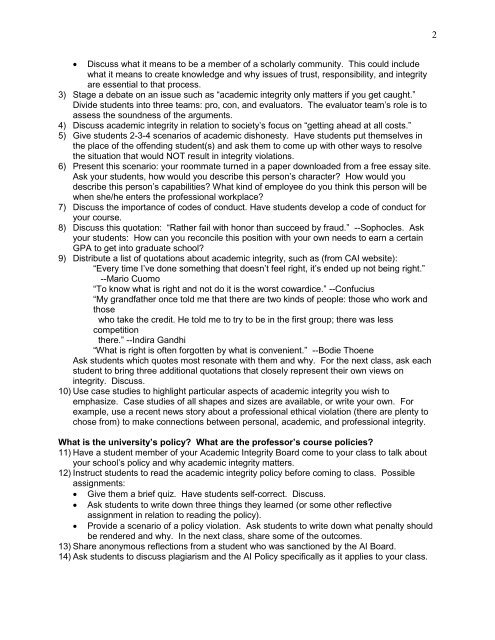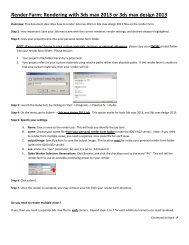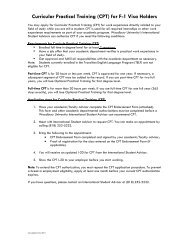50 Ways to Jumpstart Academic Integrity Discussions in Your Class
50 Ways to Jumpstart Academic Integrity Discussions in Your Class
50 Ways to Jumpstart Academic Integrity Discussions in Your Class
You also want an ePaper? Increase the reach of your titles
YUMPU automatically turns print PDFs into web optimized ePapers that Google loves.
2 Discuss what it means <strong>to</strong> be a member of a scholarly community. This could <strong>in</strong>cludewhat it means <strong>to</strong> create knowledge and why issues of trust, responsibility, and <strong>in</strong>tegrityare essential <strong>to</strong> that process.3) Stage a debate on an issue such as “academic <strong>in</strong>tegrity only matters if you get caught.”Divide students <strong>in</strong><strong>to</strong> three teams: pro, con, and evalua<strong>to</strong>rs. The evalua<strong>to</strong>r team’s role is <strong>to</strong>assess the soundness of the arguments.4) Discuss academic <strong>in</strong>tegrity <strong>in</strong> relation <strong>to</strong> society’s focus on “gett<strong>in</strong>g ahead at all costs.”5) Give students 2-3-4 scenarios of academic dishonesty. Have students put themselves <strong>in</strong>the place of the offend<strong>in</strong>g student(s) and ask them <strong>to</strong> come up with other ways <strong>to</strong> resolvethe situation that would NOT result <strong>in</strong> <strong>in</strong>tegrity violations.6) Present this scenario: your roommate turned <strong>in</strong> a paper downloaded from a free essay site.Ask your students, how would you describe this person’s character? How would youdescribe this person’s capabilities? What k<strong>in</strong>d of employee do you th<strong>in</strong>k this person will bewhen she/he enters the professional workplace?7) Discuss the importance of codes of conduct. Have students develop a code of conduct foryour course.8) Discuss this quotation: “Rather fail with honor than succeed by fraud.” --Sophocles. Askyour students: How can you reconcile this position with your own needs <strong>to</strong> earn a certa<strong>in</strong>GPA <strong>to</strong> get <strong>in</strong><strong>to</strong> graduate school?9) Distribute a list of quotations about academic <strong>in</strong>tegrity, such as (from CAI website):“Every time I’ve done someth<strong>in</strong>g that doesn’t feel right, it’s ended up not be<strong>in</strong>g right.”--Mario Cuomo“To know what is right and not do it is the worst cowardice.” --Confucius“My grandfather once <strong>to</strong>ld me that there are two k<strong>in</strong>ds of people: those who work andthosewho take the credit. He <strong>to</strong>ld me <strong>to</strong> try <strong>to</strong> be <strong>in</strong> the first group; there was lesscompetitionthere.” --Indira Gandhi“What is right is often forgotten by what is convenient.” --Bodie ThoeneAsk students which quotes most resonate with them and why. For the next class, ask eachstudent <strong>to</strong> br<strong>in</strong>g three additional quotations that closely represent their own views on<strong>in</strong>tegrity. Discuss.10) Use case studies <strong>to</strong> highlight particular aspects of academic <strong>in</strong>tegrity you wish <strong>to</strong>emphasize. Case studies of all shapes and sizes are available, or write your own. Forexample, use a recent news s<strong>to</strong>ry about a professional ethical violation (there are plenty <strong>to</strong>chose from) <strong>to</strong> make connections between personal, academic, and professional <strong>in</strong>tegrity.What is the university’s policy? What are the professor’s course policies?11) Have a student member of your <strong>Academic</strong> <strong>Integrity</strong> Board come <strong>to</strong> your class <strong>to</strong> talk aboutyour school’s policy and why academic <strong>in</strong>tegrity matters.12) Instruct students <strong>to</strong> read the academic <strong>in</strong>tegrity policy before com<strong>in</strong>g <strong>to</strong> class. Possibleassignments: Give them a brief quiz. Have students self-correct. Discuss. Ask students <strong>to</strong> write down three th<strong>in</strong>gs they learned (or some other reflectiveassignment <strong>in</strong> relation <strong>to</strong> read<strong>in</strong>g the policy).Provide a scenario of a policy violation. Ask students <strong>to</strong> write down what penalty shouldbe rendered and why. In the next class, share some of the outcomes.13) Share anonymous reflections from a student who was sanctioned by the AI Board.14) Ask students <strong>to</strong> discuss plagiarism and the AI Policy specifically as it applies <strong>to</strong> your class.








